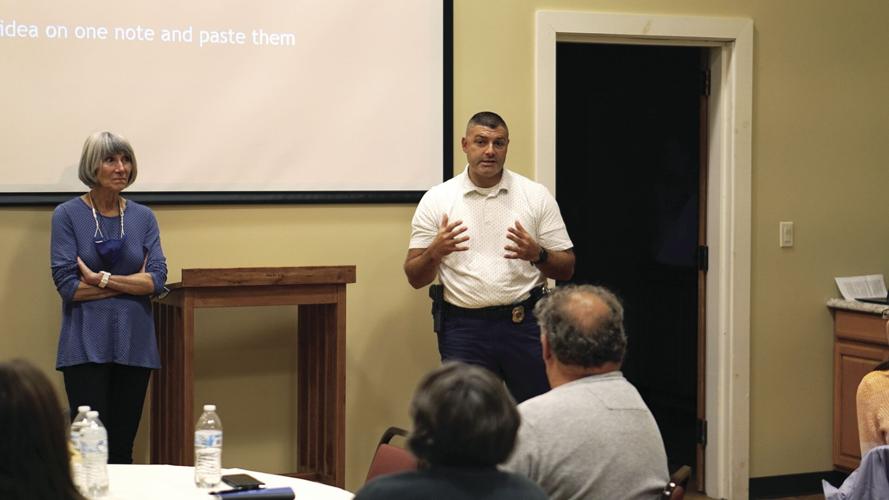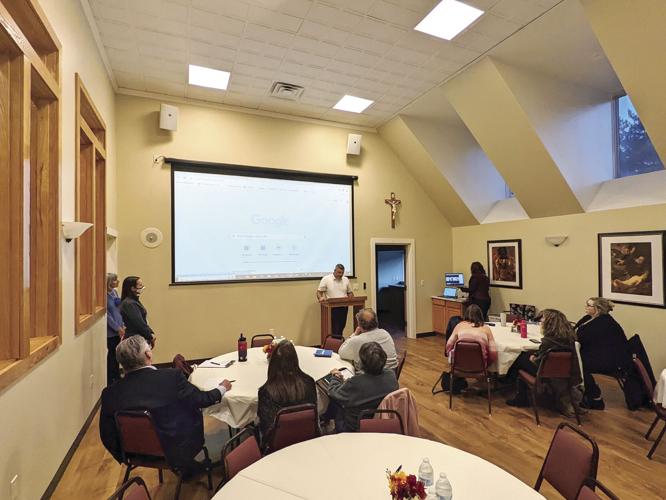LACONIA — Kathryn Hatzenbuhler shared her story of experiencing homelessness during the first of seven ward-wide community forums aimed at addressing the city's homelessness challenges. The Monday evening event saw a small but engaged crowd.
"Prior to COVID-19, our city hovered in the area of 80 to 100 unsheltered children, adults and families,” said Laconia police Det. Eric Adams in the St. Andre Bessette Parish Hall. “Since then, we’ve seen a huge uptick in the population with numbers roughly in the 300 to 400 range.”
The forums are held with a goal to educate and listen to the public, and are a joint effort between the city’s homelessness task force, JSI Research & Training Institute, a consulting firm, and the Partnership for Public Health. Monday’s meeting was informative, but only saw 15 people in attendance. Ward 2 City Councilor Robert Soucy joined via videoconference.
“I would love more turnout, because I think this is an important issue,” said JSI’s Director of Aging Services Margaret Franckhauser, who co-hosted the forum, “but I loved that people talked. I think that’s really important. We got really good ideas from this group of people. They’re dedicated to the issue."
Community member Ronnie Abbott participated enthusiastically during the question portion of the event. According to data shared by the hosts, only about 3% of people experiencing homelessness lose their homes initially due to issues of substance misuse, but many develop disorders after living on the street. Most people lose their homes due to factors outside of their control, such as high housing markets, unexpected expenses or mental illness.
“No matter who you are, where you are on the spectrum of having money, not having money, it affects all of us,” Abbott said at the beginning of the forum. “The more we let it happen, the more people it happens to next. It could be you next, or it could be someone you love next.”
When the audience was asked to share experiences with the local homeless population, Abbott shared a recent story of his mother’s phone being stolen in the parking lot of Vista Foods.
Theft and other property crimes attributed to the city's unhoused population have drawn the ire of many members of the public, increasing stigma and making progress on the issue even more difficult. For Adams, conventional forms of policing this community have failed to address the root cause of the problem.
“Where does arresting them end?” Adams said. “For the most part, there are no major crimes being committed that lead to long jail or prison sentences, so we end up back at square one. We issue summons and arrests when we need to, but this is not a long-term solution. The last thing we want to do is criminalize homelessness.”
One of the forum's primary goals is to educate the public and dispel some of the myths and stigma surrounding homelessness.
A key component of that effort, Hatzenbuhler shared her story of experiencing homelessness with attendees. Hatzenbuhler, who now works for the Partnership for Public Health, moved into an apartment just four days before recording her story on video. She experienced homelessness since 2018, after losing her job and eventually her apartment.
Hatzenbuhler had to quit her job while suffering from complex PTSD. Her husband was also employed at the time as a bank teller. After suffering some expensive car troubles, the couple was evicted after failing to pay rent on time.
“My husband stayed that night in the Walmart parking lot in Tilton in our car,” Hatzenbuhler recalled. “My husband got up the next day, put on a suit and went to his job as a teller at Meredith Village Savings Bank. Nobody he worked with, nobody beyond some of our closest friends and family had any idea we were homeless.”
Hatzenbuhler then spent the next few years working seasonal jobs as far away as Alaska that offered employee housing. During the offseasons, she did her best to stay with friends and family.
“The big piece of why I ended up homeless in the first place was genuinely not having enough income to cover the basic expenses of what it costs to rent an apartment and pay utilities in New Hampshire,” Hatzenbuhler said. “Homelessness doesn’t look like what you think it looks like.”
In addition to educating the public and humanizing the homeless, the forums also seek ideas for solutions from the community.
“Someone in these forums may have the brilliant idea that nobody else has thought of and solves it, that’s my hope,” Adams said, stifling a chuckle. “Don’t fall out of your chair, but seriously, we all have to have a little bit of hope.”
After the seven forums are complete, JSI will collect the data from audience questions and suggestions, and package them into a report for review by the mayor’s homelessness task force. From there, organizers hope to find actionable and feasible solutions that can be implemented over a three- to five-year plan.
Among the list of audience suggestions at the first forum was to open Isaiah 61 Cafe’s beds year round, expand affordable housing and engage employers to develop employee- and low-income housing.
As the region’s homeless population has increased, the available resources have not kept up with demand. Laconia’s lack of affordable housing was discussed thoroughly as a key driver pushing individuals and families closer to experiencing homelessness.
As of this writing, there are approximately only 80 beds in the city that can serve the population of people experiencing homelessness. Of these 80 beds, only 50 are available year-round. These 50 beds are also considered “high barrier,” meaning applicants must be drug- and alcohol-free. The remaining 30 beds are at Isaiah 61 Cafe and are considered "low barrier," meaning there is no requirement to be sober. However, the beds at Isaiah 61 Cafe are only available during the winter months. One suggestion from the audience was to open Isaiah year-round.
For working people, finding and keeping a home continues to be a challenge in the Lakes Region.
“Zero point seven percent is Belknap County’s vacancy rate,” said Daisy Pierce, executive director of Navigating Recovery. “Statewide is about 0.5%, so we’re a smidge better than the state.”
A healthy vacancy rate is considered to be 5%. With constantly increasing rents, financial pressures and a difficult building code, locals are hard pressed to find affordable housing. Pierce also cited information that, working at minimum wage, a local worker would have to work at least 80 hours a week to afford a one-bedroom apartment in the Lakes Region.
According to data presented by Pierce, the annual income necessary to afford a fair market apartment is $51,000 a year, well above minimum wage.
“It’s really hard when you are in a place like New Hampshire, where there’s a lot of tourism dollars, and a lot of people who have vacation homes here,” Hatzenbuhler said.
“There’s that whole gentrification aspect. People are playing here, but I live here and I can’t afford to live here. That’s really heartbreaking,” Hatzenbuhler continued, citing her previous experience working in the hospitality industry. “To be honest, being someone who works in hospitality, you have guests, you're serving people, and they’re not very nice to you a lot of times, and they have no appreciation of how desperately you need that job. How desperately you need that money that’s coming from them. You feel like a beggar, and it’s humiliating. It’s that shame and humiliation that I think really helps to keep people in that place.”
Although Hatzenbuhler has finally found housing in the area, it is only temporary. Some landlords have opted to do short-term, three- to nine-month leases in order to avoid the standard headaches that come with year-long leases, and to cash in on “vacation rental” prices. Such practices further reduce housing availability and the ability of employers to maintain staffing. Zoning regulations as well as construction and development costs were also mentioned as major roadblocks to creating more affordable housing in the area.
“It’s very difficult to build anything anywhere,“ said Gail Ober, a Laconia resident and former member of the city’s Master Plan Steering Subcommittee. “We crafted an ordinance that was brought through the planning board, and that was to allow people to build accessory dwelling units without having to go through a lot of the processes in the land use department, which are very intimidating,” Ober continued, adding that the measure was tabled by the city council. “Our goal was to try, in some small way, to increase the number of units available within the city, without a major development of land that may not be developable without a huge cost. As of this moment in time, somebody needs to try to bring that off the table at the city council.”
In a later statement, Ober said she left her seat on the committee because she did “not believe that the political will exists to address this problem at its root cause of housing supply and zoning.”
Democratic Ward 2 House of Representatives candidate Bob McClean said he was hopeful the forums would be productive.
“I’m happy this occurred because I've been out talking to people and this is a bigger issue than I think all of Belknap County realizes,” McClean said, adding that he’d been searching for more solutions. “The other day I found a sober house, and I talked to the woman running the sober house, and asked her why a landlord in the middle of Laconia became a sober house instead of renting apartments and making money. She said there’s subsidies.”
McClean said there appeared to be both federal and state subsidies related to sober living, and that both could be explored.
Abbott cited the current political climate as another roadblock to finding solutions, and in that more people from all political and economic spectrums should attend and participate in the forums.
“You have one side that wants to throw a bunch of money at everything, saying money will fix it all, and you have the other side saying ‘No, those are my tax dollars,'’’ Abbott said. “You have these two sides constantly battling about it. I think this political climate we have just keeps us from working together.”
Upcoming forums take place throughout the city, each 6-8 p.m. Guests can register by visiting facebook.com/PPHNH. The locations and dates of each forum are:
Thursday, Oct. 6 — Ward 4, Laconia Congregational Church
Monday, Oct. 17 — Ward 3, Laconia Middle School
Thursday, Oct. 20 — Ward 6, Leavitt Parkhouse
Thursday, Nov. 3 — Virtual on Zoom
Monday, Nov. 7 — Ward 1, Church of Jesus Christ of Latter-Day Saints
Thursday, Nov. 10 — Ward 5, Woodland Heights Elementary School





















(0) comments
Welcome to the discussion.
Log In
Keep it Clean. Please avoid obscene, vulgar, lewd, racist or sexually-oriented language.
PLEASE TURN OFF YOUR CAPS LOCK.
Don't Threaten. Threats of harming another person will not be tolerated.
Be Truthful. Don't knowingly lie about anyone or anything.
Be Nice. No racism, sexism or any sort of -ism that is degrading to another person.
Be Proactive. Use the 'Report' link on each comment to let us know of abusive posts.
Share with Us. We'd love to hear eyewitness accounts, the history behind an article.